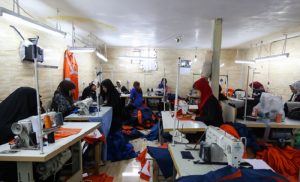
Poor Working Conditions Create Desperation among Iran’s Women Workers
On the occasion of International Workers Day, the National Council of Resistance of Iran (NCRI) Women’s Committee reported on the plight of Iranian women workers. The report describes the poor working conditions faced by Iranians as a whole and by women specifically. It also describes the role of women in the recent uprising in Iran. Women have been a vocal part of the resistance movement, calling for equitable treatment and freedom from oppression.
Iranian workers as a whole have suffered under the mullahs’ regime. Workers may go months without being paid for their work, with some not seeing their salaries for over a year. In desperation, these workers do whatever they can to get money to survive, including taking out loans with interest or even selling their organs.
The plight of women workers in Iran is even direr. Discrimination against women is enshrined in law, and they suffer the consequences of this discrimination in their employment and every other facet of daily life.
The Iranian regime is a member of the UN Commission on the Status of Women (CSW), which is charged with “eliminating structural barriers and discriminatory laws” and “creating equal economic opportunities.” The regime has chosen not to adopt any of the recommendations made by the CSW, choosing instead to further discriminate against and marginalize women.
Ali Khamenei has made his feelings about women very clear. He says that women “physically and emotionally have been created by God for a special role in life” and “the issue of women’s employment is not among the main issues,”
according to the NCRI report. The result of this misogynistic viewpoint is that women in Iran are paid low wages to work jobs in unsafe conditions with no insurance or benefits and little to no job security.
Women heads of household fare the worst among workers under the mullahs’ regime. The recent budget slashed child benefits for women heads of household. Subtracting this money from an already insufficient salary has left these women unable to provide for their families without taking extraordinary measures.
Women have been the most harshly affected by the recent bankruptcies of many businesses in Iran. When the economy struggles, women are the first to be laid off. Married women, in particular, suffer in these conditions. Many employers fire married women in favor of single workers because they do not want to have vacancies during maternity leaves. The regime recently even made it legal to fire women who take maternity leave.
On September 15, 2017, the state-run Tasnim news agency reported:
“The General Board of Directors of the Administrative Court of Justice rescinded a directive by the general director of the Labor Ministry which had banned laying off working mothers for two years while they nurse their children. The Administrative Court of Justice pronounced the directive as unlawful and outside the jurisdiction of the body that had adopted it.”
According to the NCRI report, highly educated women in Iran also suffer from low wages and lack of benefits. Most college-educated women cannot find work in their chosen fields and resort to low-paying, menial jobs, thanks to an employment market that favors men.
Faced with such dire economic conditions, many women are forced to take desperate measures. Women heads of household are sometimes forced to sell their own organs to provide for their families. The regime has even acknowledged the lengths working women in Iran have had to go to in order to help their families survive. Shahindokht Molaverdi, regime President Rouhani’s deputy for women’s affairs, said:
“Today, we witness the sale of unborn infants in their mothers’ uterus and before they are born. We do not know the exact numbers but their numbers are large enough to make the news.” (The state-run ILNA news agency, June 22, 2016)
The NCRI report noted that women’s voices have been some of the loudest in the recent uprising and subsequent protests across Iran. Iranian women are lifting their voices to demand change.
Staff Writer
